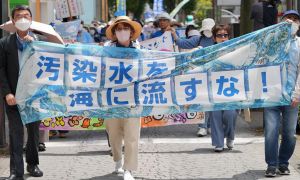Recent developments have dramatically affected the geopolitical dynamics surrounding the Panama Canal, particularly fueled by rising tensions between the United States and China. Panama has decided to formally withdraw from China's Belt and Road Initiative, prompted by increasing concerns over Beijing's influence over the strategically significant waterway. President José Raúl Mulino has made it clear during recent diplomatic engagements with U.S. officials, including Secretary of State Marco Rubio, asserting Panama's sovereignty over the canal is not up for debate.
This announcement follows remarks by former U.S. President Donald Trump, who reiterated his belief during public statements on Sunday, stating, "China is running the Panama Canal... we’re going to take it back, or something very powerful is going to happen." His rhetoric highlights the extent of U.S. concerns about China’s alleged control over this pivotal trade route and its potential breach of established agreements.
During Rubio's first overseas trip as Secretary of State, he met with Mulino to address these concerns. While Mulino confirmed his country's sovereignty and outlined Panama's intention not to renew the 2017 Memorandum of Understanding (MoU) with China, he also discussed opportunities for increased U.S. investments. Mulino said, "I think this visit opens the door to build new relations... and try to increase as much as possible U.S. investments in Panama." This reflects Panama's desire to strengthen its ties with Washington amid shifting allegiances.
Historical perspective is also important to understand the significance of these interactions. The Panama Canal was originally constructed by the United States and transferred to Panama under the terms of the 1977 Neutrality Treaty, which permits U.S. military intervention if the canal's operations are disrupted. After the canal's transfer, it has seen unprecedented levels of cargo throughput, significantly more than during U.S. control, showcasing its importance to global trade.
Nonetheless, concerns linger about Hutchison Ports, the company operating terminals around the canal, which is linked to Chinese interests. The company, part of CK Hutchison Holdings, is one of the world's largest port operators. Although it oversees several terminals, it does not control access to the canal itself. Mulino emphasized during discussions, "We have to wait until the audit ends before we can reach our legal conclusions and act accordingly." This statement reflects Panama's cautious approach as it navigates its relationships with both China and the U.S.
Mulino's reassurances aim to quell fears of possible military intervention by the U.S., emphasizing there is no real risk posed against Panama. He noted, "Sovereignty over the canal is not up for discussion," asserting the independence of Panama's decisions and reinforcing the importance of its territorial rights.
Part of the diplomatic conversation also touched on extending migrant repatriation programs involving the U.S., indicating the cooperation between the two nations on broader issues beyond solely commercial interests. Mulino made it clear, stating, "Panama won’t invest a single dollar in it" when discussing the financial burden of repatriation efforts, clearly delineated the roles each country must play.
Overall, the uneasy balance of sovereignty and international influence plays out dramatically through the lens of the Panama Canal, with rising U.S.-China tensions casting long shadows over diplomatic relations. The decisions made by Panama will invariably influence how these two powerful nations position themselves within Central America, potentially reshaping regional dynamics for years to come.



